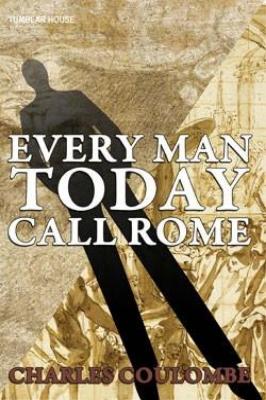

This is the book that put Charles Coulombe on the map, as a force to be reckoned with! It is comprised of three sections. The first and largest section outlines the history of world events which have shaped our world and have ultimately led to the current crisis in the Church. The second part discusses changes in the approach to the Mass, the Sacraments, and Christian life as a whole. Mr. Coulombe closes the book by explaining how a person can safeguard the integrity of his faith amidst all the challenges of today's world. Everyman Today Call Rome is a historical narrative that is loaded with wit and insights in typical Coulombe fashion that you will not want to miss.
Many priests, in these new age days, would prefer to relinquish their mystic power. They would rather be presidents of the assembly than offerers of the altar; initiators than baptisers; counselors than confessors. So be it. But let them give up also their salaries and sinecures, their cooks and Cadillacs. If we laymen forced them to consider, the question not in terms of theology, but in terms of revenue, orthodoxy would bloom.
The time is coming when we young people will hold the Church in our hands. If we are to do our duty to Christ the King, we must accept the challenge of Catholic reconstruction. To do that, we must each of us acquire the education denied us. We could not help being robbed; we can blame only ourselves if we remain poor.
This bebop “rebel without a cause” attitude affected every sector of Catholic practice in the 1960s and 70s, and is with us yet. But by trivialising the Church in their care, our predecessors did more than gratify their own egos. They made the Church appear to be less than worth dying for, and thus less than worth living for. And in doing so they lost the greater part of our generation.
There is to our generation a nihilism: that is, a nothingism. For us, there are no absolutes, no morals, no vices, and no virtues. We have been raised to believe that our own desires are the only goals we need. But it is not so. We have been taught that all desires can come true. But that is a lie. Our unachievable quest for constant gratification becomes a mere flight from pain that is as unrealistic as it is useless. That flight can go only into a dead end. Contrary to what our mentors, either at home or on the boob tube, have said, there is no happiness without responsibility, and there is no responsibility without pain.
It follows, then, that before we can do anything constructive, we must rid ourselves of certain mental preconditioning bequeathed to us by the factors mentioned above. Of all the generations ever spawned in this land of the free and home of the brave, ours has been the most nourished by lies. Falsehood throbs, pumps, and flows through our thought. Getting everything we want will make us happy. Sex will make us happy. Drugs will make us happy. We alone can determine what is right for us. If only we push hard enough, total freedom and total indulgence will bring total joy. We have been sold a bill of spoiled goods, and for lack of learning, wisdom, or age, we have bought them.
But we can only get so close to another person, and no further. As we were created for loving union with our Creator, it follows that union is the unconscious model for all of our relationships. In the Eucharist, that real and total union we hunger for occurs, and fills us with life. The lack of that union is eternal death.
If we, the youth of today, can congratulate ourselves on our superior intelligence, we may also think about our greater indifference. If a hostile government persecuted the Church in America, would we drop all our hopes of career, family, and rush off to the barricades? Would an American counterpart of the Mexican Cristero or the Austrian Heimwehr spring up, vowed to save Catholicism or die in the attempt? Would we be like the brave Knights of Gondor, who rode against Sauron’s legions to defend Minas Tirith, despite certain defeat? Prudence and insight often conceal a tepid, weak heart.
If we wish to free our Church and our country from the evil ideas and the evil men who enslave them, we must first become people of prayer. Otherwise, it would merely be a case of substituting one set of scoundrels for another, of corrupt young fools for corrupt old fools. Are not most (if not all) political revolutions like that? The only method of avoiding becoming the mirror images of the enemy is that of prayer, penance, and humility.
Beware, however, of theologians who try to “interpret, nuance, or rethink,” infallible statements. Had Pope or Council meant something different from what they clearly said, they would have said something else. Often this “nuancing” is done to remove uncomfortable doctrine. But if the doctrine is uncomfortable, it is the theologian who must be “nuanced.”
:
Charles A. Coulombe is one of North America’s most respected and sought-after commentators on culture, religion, history, and politics. A specialist in the history and government of the Catholic Church, Coulombe’s influence and expertise extend far beyond matters religious. He has written on topics ranging from the history of rum to haunted houses to a history of the United States.Mr. Coulombe is a social and political commentator of note. In 2005 he provided narration and commentary for ABC News during the funeral of Pope John Paul II and the subsequent election and installation of Pope Benedict XVI. A former journalist, Mr. Coulombe served as a film reviewer and Contributing Editor of the National Catholic Register, during which time he received the Christian Law Institute's Christ King Journalism Award. Coulombe's work has appeared in over than 20 journals, including regular columns in Fidelity (Australia), PRAG (London), Monarchy Canada, and Creole Magazine (Louisiana). He has also been a frequent contributor to such publications as Success, Catholic Twin Circle, Gnosis, FATE, and the New Oxford Review.
As an informed and passionate speaker on a wide variety of religious, social, political, historical, and literary topics, Mr. Coulombe has appeared on lecture circuits throughout the North America, Europe, Australia, and New Zealand. In 1992 he lectured at Oxford University and the following year embarked on a lecture tour of Ireland and Great Britain, returning to Oxford and Cambridge in 1995. Coulombe has also delivered lectures at the University of Southern California on the history of Rock & Roll and at Cleveland's John Carroll University on the history of medieval monarchy. In February 2011, he was invited to take part in a debate on the abolition of the monarchy before the prestigious Oxford Union.
